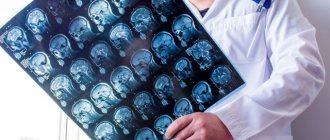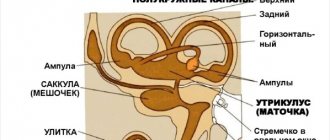the whole list
Dizziness is one of the most common reasons why patients visit a doctor. Currently, there are about 80 diseases and conditions that can be accompanied by a feeling of dizziness. These include: diseases of the cardiovascular, endocrine, nervous systems, pathology of the organ of vision, blood diseases, head and neck injuries, nutritional disorders, poisoning, stress, depression, as well as pathology of the middle and inner ear.
Regardless of the root cause, dizziness leads to a deterioration in general physical condition and performance (up to complete disability), and can lead to depression and fear of falling; some patients stop leaving home and limit their life activities - all this, of course, ultimately affects the quality of life.
Thus, timely identification of the cause of dizziness and timely treatment are very important.
Numerous studies have shown that the most common cause of dizziness is pathology of the vestibular system at its peripheral level, in other words, outside the central nervous system. It is peripheral vestibular (and auditory) disorders that are dealt with by an otoneurologist.
The most frequently asked questions during an otoneurologist appointment:
- What additional studies are needed to prepare for a consultation with an otoneurologist?
You can undergo an audiological examination in advance ( but it is not necessary to do this before the consultation ) and consult with a neurologist. No other special studies are needed in advance, since there are a large number of diseases accompanied by dizziness, and it is impractical to carry out all the studies to identify the root cause. After the examination, the otoneurologist will determine the range of necessary additional examinations.
For what purpose is it being checked?
Passing a medical examination before issuing a driver's license is a familiar procedure for everyone.
Doctors check whether a particular person has contraindications for driving a vehicle. If none have been identified, then he receives a driver’s license.
The condition of a particular person is assessed by various doctors. The need to undergo an EEG in 2014 came as unexpected news for drivers.
This study is quite specific and is used to determine a limited range of diseases.
Not all hospitals have special equipment for performing EEG. Passing it is an additional cost for drivers.
It should be noted that this rule did not last long. In 2021, the obligation to undergo an EEG remains only for drivers of categories C and D.
But keep in mind that this examination can be prescribed to any patient if the neurologist decides so.
Why undergo an EEG? Such a study allows us to establish the presence of serious pathologies. All of them pose a great danger when driving a vehicle.
Identifying these ailments makes it possible to protect both the driver and other road users.
The main stages of the initial consultation with a neurologist
A medical appointment begins with an examination of the symptoms that bother the patient. Then the doctor conducts an external examination of the patient, during which he pays attention to the condition of the skull, the presence of tremors in the arms or body, and the symmetry of the shoulders and limbs.
After this, the specialist checks the patient’s reflexes (pupillary, skin, mucous membranes, tendon, periosteal), muscle-joint sensitivity, coordination of movements, and the ability to assess one’s spatial position. At this stage, the function of the cerebellum is also examined using the heel-knee and pointing test, and the nadiadochokinesis test.
Based on the results of physical diagnostics, the neurologist selects additional examinations for the patient. Their list may include:
- Doppler ultrasound;
- and MRI;
- angiography;
- rheoencephalography;
- electroencephalography.
Having made a final diagnosis, the doctor prescribes medications to the patient to help normalize blood pressure and improve blood flow in the brain. In advanced cases, the specialist refers the patient to surgery (angioplasty, carotid endarterectomy).
The legislative framework
The procedure for undergoing medical examinations is constantly changing.
So, the last of them happened in 2021. The new procedure was introduced by order of the Ministry of Health No. 344. This document extends its force to the territory of the entire Russian Federation.
The new rules came into force in March 2021. The previous procedure for undergoing medical examinations was canceled by this order.
Read the explanation of the categories of the new driver's license here.
It will apply to both driver candidates and those who are re-obtaining their licenses. The examination itself is carried out to identify medical contraindications for driving the vehicle.
The presence of a contraindication is established in accordance with Government Decree No. 1604.
Portrait of a competent headache specialist
A progressive cephalgologist at an appointment with a patient is at the same time a doctor, a detective, and even a philologist, because a headache is described in dozens of different formulations, and each of them can be a key to solving the diagnosis.
A modern specialist is guided by the following principles:
- follows international treatment criteria;
- does not recognize the old approach: treating headaches with droppers 2 times a year, ignoring (“everyone has a headache”), uncontrolled relief with painkillers;
- constantly studies, improves qualifications in the field of headaches and related specialties, exchanges valuable experience with colleagues, discusses and practices in complex and unusual cases;
- sets realistic goals: does not promise a miracle cure, speaks directly about what will be effective and what will not, and how long therapy may take;
- approaches treatment individually: considers the patient’s lifestyle, medical history, genetics and psychological aspects.
The cephalologist also teaches the patient himself reliable information about the disease. This is important because ideas about headaches are surrounded by dozens of rumors and false theories. A doctor who treats persistent headaches is able to explain:
- why the cause of pain is not related to blood vessels and osteochondrosis;
- the role of antidepressants in the treatment of headaches;
- how to properly relieve an attack of pain and much more.
Cephalgologist
Cephalgology is a narrow branch of neurology, specializing in the study and treatment of headaches. A cephalgologist is not the one who will prescribe “drink analgin and drip drips.” The modern approach is different. Not only medicinal, but also behavioral and psychological.
There are several types of dizziness, and even more - headaches. And even more - their possible causes and combinations in each unique human body. A cephalologist has the techniques and knowledge of their detection and treatment.
Important aspects
All candidate drivers, as well as those who already have a license to drive a vehicle, undergo a medical examination.
In the latter case, you must obtain a certificate when changing your driver's license. The purpose of such a medical examination is to identify diseases for which it is prohibited to drive a vehicle. A car is a source of increased danger.
It can cause damage to property, as well as the life or health of citizens. Some diseases exclude the possibility of driving a vehicle.
Such ailments can cause serious and irreversible consequences. That is why the state obliges motorists to undergo inspections.
Without the appropriate certificate, they cannot obtain a license to drive a vehicle. We have already mentioned that epilepsy is one of the diseases that prevent you from driving.
This is due to the fact that patients experience seizures with loss of consciousness. The presence of epilepsy is detected by conducting an EEG.
This study is safe and painless for the patient. That is why everyone without exception can undergo it, including pregnant women.
In 2014, EEG was made mandatory for all driver candidates, as well as those motorists who change their license.
This caused a flurry of dissatisfaction due to the rise in price of the commission and the increase in the time it takes to complete it. In addition, equipment for performing EEG was not available in all hospitals.
This obligation has now been abolished. Today, only those drivers who apply for certain categories of driver’s license must undergo such a study.









